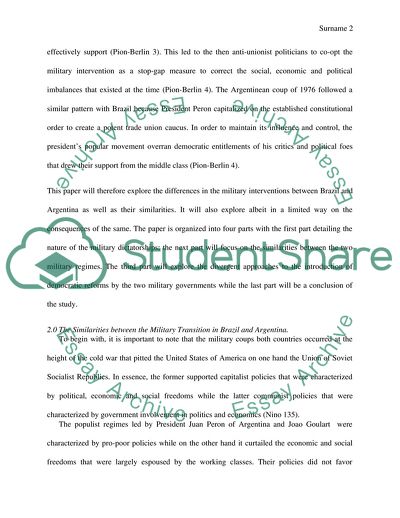Cite this document
(The Comparison of Transition from Dictatorship to Democracy in Brazil Coursework Example | Topics and Well Written Essays - 2250 words - 1, n.d.)
The Comparison of Transition from Dictatorship to Democracy in Brazil Coursework Example | Topics and Well Written Essays - 2250 words - 1. https://studentshare.org/politics/1870120-the-comparison-of-transition-from-dictatorship-to-democracy-in-brazil-1964-and-argentina-1976
The Comparison of Transition from Dictatorship to Democracy in Brazil Coursework Example | Topics and Well Written Essays - 2250 words - 1. https://studentshare.org/politics/1870120-the-comparison-of-transition-from-dictatorship-to-democracy-in-brazil-1964-and-argentina-1976
(The Comparison of Transition from Dictatorship to Democracy in Brazil Coursework Example | Topics and Well Written Essays - 2250 Words - 1)
The Comparison of Transition from Dictatorship to Democracy in Brazil Coursework Example | Topics and Well Written Essays - 2250 Words - 1. https://studentshare.org/politics/1870120-the-comparison-of-transition-from-dictatorship-to-democracy-in-brazil-1964-and-argentina-1976.
The Comparison of Transition from Dictatorship to Democracy in Brazil Coursework Example | Topics and Well Written Essays - 2250 Words - 1. https://studentshare.org/politics/1870120-the-comparison-of-transition-from-dictatorship-to-democracy-in-brazil-1964-and-argentina-1976.
“The Comparison of Transition from Dictatorship to Democracy in Brazil Coursework Example | Topics and Well Written Essays - 2250 Words - 1”. https://studentshare.org/politics/1870120-the-comparison-of-transition-from-dictatorship-to-democracy-in-brazil-1964-and-argentina-1976.


